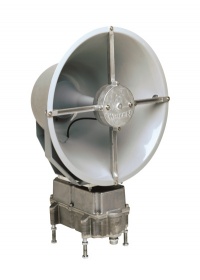HORNET: Difference between revisions
ArxCyberwolf (talk | contribs) (Moved page over from the CDS Wiki.) |
ArxCyberwolf (talk | contribs) m (ArxCyberwolf moved page Hornet to Whelen HORNET) |
(No difference)
| |
Revision as of 22:14, 12 August 2024
| Whelen HORNET | |

| |
| Company | Whelen Engineering |
|---|---|
| Produced | 1996-present |
| Type | Rotational Electronic |
| Sound output | 118 dB @ 100 ft |
| Wattage | 400 W |
| Voltage | 24 V DC |
| Preceded by | Whelen WS-2000 |
| Documentation | Manual Product sheet |
The HORNET is a unique tone-only rotational electronic siren produced by Whelen Engineering, and is designed to be a cost effective, cheaper alternative to the WPS-4000 and VORTEX-R series of sirens, and effectively fills the niche its predecessor the WS-2000R tried to fill.
The HORNET is quite a capable siren for its purpose, as a short to midrange electronic siren. It is often used at fire stations and parks where a louder siren is either too expensive or not practical to use and sometimes supplements larger systems of Whelen sirens. The HORNET has not sold as many units as the mainline WPS-4000 series, and its role has been somewhat taken by the VORTEX-R1, which is also a single-driver siren. Despite this, the HORNET continues to be sold by Whelen alongside their other sirens.
History and Design
The HORNET was first introduced in 1996, a year after the VORTEX-R series of sirens was first introduced. While the VORTEX was more cost effective, using a cheaper rotator and lacking voice capabilities to reduce costs, it still proved to be too expensive or powerful for some municipalities. As a result, Whelen designed and released the HORNET as an ultra-low-cost option for cities looking for a rotational electronic siren. The HORNET is a single driver electronic siren, making use of a single 400 W "Superpower" speaker driver, the same one used in Whelen's other sirens. The driver is attached facing backwards to the front of the siren inside of a round protective casing, which is held in place by 4 support struts at the front of the projector. The sound is sent backwards through the small cone and amplified, then projected out the front of the siren using the bell-shaped projector. The projector is made of fiberglass to prevent corrosion and is held in place by three thin sheets of metal.
Like Whelen's other rotational sirens (excluding the WS-2000R), the driver is wired directly to the amplifier, instead of using brushes or slip rings. Because of this, the siren oscillates back and forth 360° instead of rotating fully, oscillating at 2 oscillations per minute.The rotator itself is a rectangular reversible direct-drive rotator and is the same rotator used on newer VORTEX-R sirens. It offers no quadrant control or other special features, and the projector is offset on it. Early HORNET units made use of the simple belt-drive rotator that early VORTEX-R units had, before the direct-drive rotator was introduced. The HORNET's design maximizes the sound output of the single driver it has, reaching 118 dB at 100 ft.
WS400H
The WS400H is a directional, non-rotational version of the HORNET, designed to be used as part of an array or as a standalone speaker. It consists of one or more HORNET projectors mounted to a pole or wall, fulfilling a similar purpose as the Federal Signal DSA, ASC E-Class, and ATI HPSS. It is mounted on a swivel, allowing it to be pointed downwards. The WS400H is very rare, as it is not well advertised by Whelen and the few units that were known to exist have largely been removed or destroyed. The HORNET speaker is not designed or suited for omnidirectional use, and sirens such as the WPS-2800 and 2900 proved to be much more effective. Despite its lack of sales, the WS400H remains in production today.